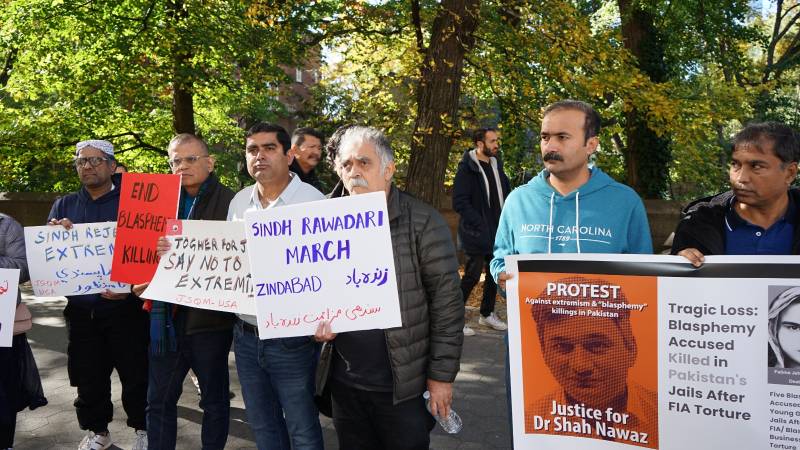
A group of concerned Pakistani expatriates, rights activists and other citizens have expressed concern over a growing trend of violence linked to religious extremism in Pakistan, including murders in police custody, as well as the patronisation of religious extremist groups by the state and demanded the government take steps to reverse this disturbing trend by introducing critical reforms and prevent the misuse of laws as a cover for mob violence and religious extremism.
This demand was put forth by dozens of protesters who had gathered outside the Pakistani Consulate in New York the other day. The protesters held up posters and placards inscribed with demands such as "Justice for blasphemy victims," "Justice for Dr Shahnawaz," "Release Junaid Hafeez," "End blasphemy killing," and "Sindh Rawadari March Zindabad," among others.
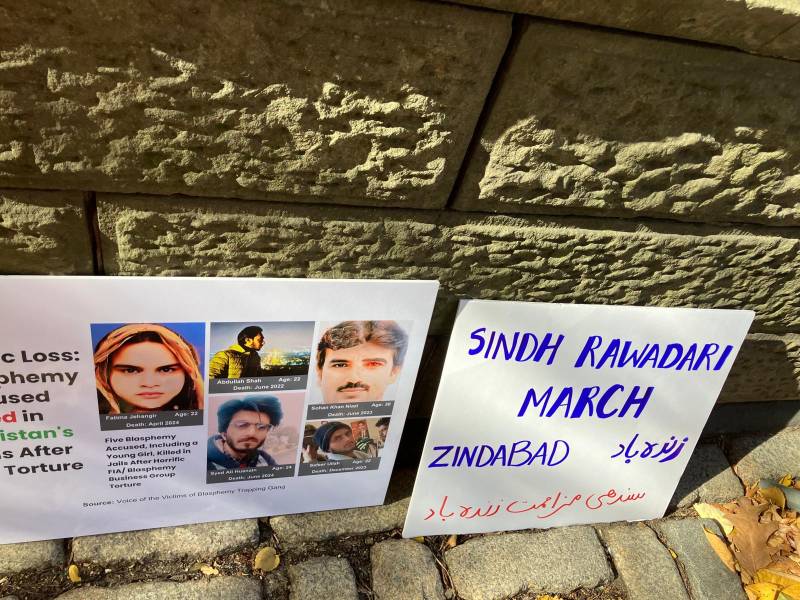
The protesters pointed to recent incidents where blasphemy accused were killed in police custody, highlighting the urgency for systemic policy reforms to protect the victims of blasphemy accusations and end religious extremism.
"We are here to protest the extrajudicial killing of Dr Shahnawaz Kunbhar from Umarkot District, Sindh. Sindh Police brutally tortured and murdered Dr Kunbhar in a staged encounter over false blasphemy accusations instigated by Omar Sarhindi," read the protest petition.
They added that in a horrifying display of religious extremism, a mob desecrated Dr Kunbhar's body and set it on fire in broad daylight. They added that the incident was far from isolated and mirrors another recent case from Quetta, Balochistan, where a blasphemy accused was killed by a police Constable while in custody in September 2024. In response, JUI-P Senator Abdul Shakoor Khan voiced support for the police officer and offered to cover all of his legal expenses, demonstrating support for extrajudicial blasphemy-related violence within the state infrastructure. Fearing for their safety, the victim's family was compelled to forgive the officer, revealing a pattern of coercion and intimidation.
They said the murder of Dr Kunbhar was part of a broader pattern of blasphemy-related violence in Pakistan which predominantly targets vulnerable individuals, especially young people, and religious minorities, including the Christian and Ahmadiyya communities. They recalled how, in August 2023, false blasphemy accusations against two Christian residents in Jaranwala, Faisalabad, led to widespread mob violence that desecrated over 20 churches and destroyed 80 homes. Following this, in May 2024, a Christian man in Sargodha faced a similar fate, and he was lynched in the street while his workplace was torched over allegations of desecrating religious texts. Another incident in June 2024 saw a Muslim man in Swat, Khyber Pakhtunkhwa, burnt alive by a mob on similar allegations. These events indicate an entrenched culture of blasphemy accusations precipitating unchecked violence.
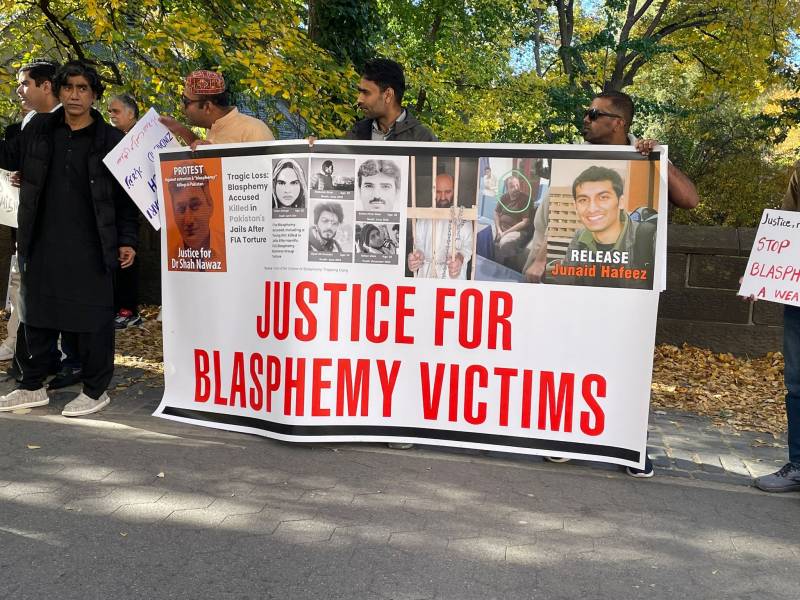
The protesters called on the Pakistani government to urgently address the growing trend of levelling fake blasphemy charges against the youth, particularly those targeted by the so-called "Blasphemy Business Groups" which exploits vulnerable young people by manipulating them into sharing blasphemous content online, leading to their arrest and imprisonment on fabricated charges. They accused the group of being involved in running blasphemy campaigns against activists.
"Currently, hundreds of young people are languishing in prison due to these manipulated accusations. Of particular concern is the case of five young people who have died in police custody under conditions of extreme abuse, including torture, denial of healthcare, and neglect by jail authorities," the protesters said, adding, "We demand legal action against the 'blasphemy business group' and the immediate, unconditional release of its victims."
They expressed concern at the upsurge in discrimination and violence targeting the Ahmadiyya community, including extrajudicial and targetted killings, arbitrary arrests and detentions, attacks on places of worship and graveyards, and curtailment of fundamental freedoms such as free expression, peaceful assembly, and association—often at the instigation of extremist groups. They pointed out how two Ahmadis had been killed in targeted attacks so far this year. The first attack took place on March 4, 2024, when the president of the Bahawalpur Ahmadiyya Muslim Community was assassinated, followed by the killing of Saadullah Pur on July 8, 2024. A worrying rise in the attacks on Ahmadi places of worship and cemeteries since early 2023 has continued this year alongside 36 documented cases of arbitrary detention, police harassment, and restricted religious rites during Eidul Azha.
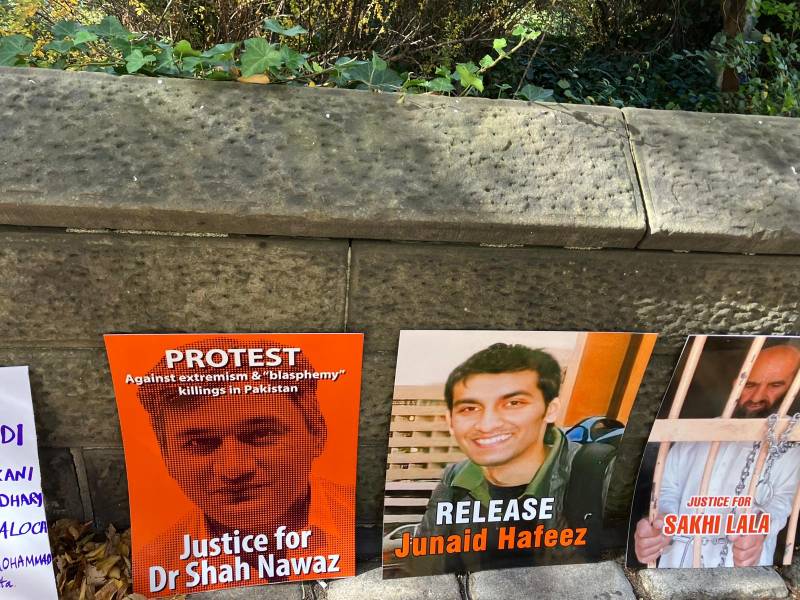
These measures, the protesters said, perpetuated a climate of vulnerability and fear for the Ahmadi community.
"We urge the government to urgently reform blasphemy laws, as they have enabled severe human rights violations, systemic discrimination, and mob violence," they said, adding that blasphemy-related incidents reveal unchecked violence while those inciting such violence enjoy impunity. This ongoing lack of accountability not only endangers religious minorities but also undermines Pakistan's commitment to human rights.
"To uphold justice and ensure public safety, Pakistan must establish rigorous, impartial legal processes to prosecute acts of incitement and violence conducted under the guise of blasphemy," the protesters jointly demanded. These measures, they hoped, would foster a safer environment for all citizens and promote social harmony.
"We further urge the state (of Pakistan) to implement protective measures for religious minorities in Pakistan, ensuring their safety and security and promoting a culture of tolerance and respect for all faiths."
They further demand a comprehensive and impartial investigation into the circumstances surrounding Dr Kunbhar's killing and other custodial murders of blasphemy victims, ensuring that all responsible parties, including police officers (DIG Javed Jiskani, Mirpurkhas SSP Asad Choudary, SSP Asif Raza Baloch, SHO Sindhari and others) and those who incited mob violence, particularly Omar Sarhindi, are held accountable.
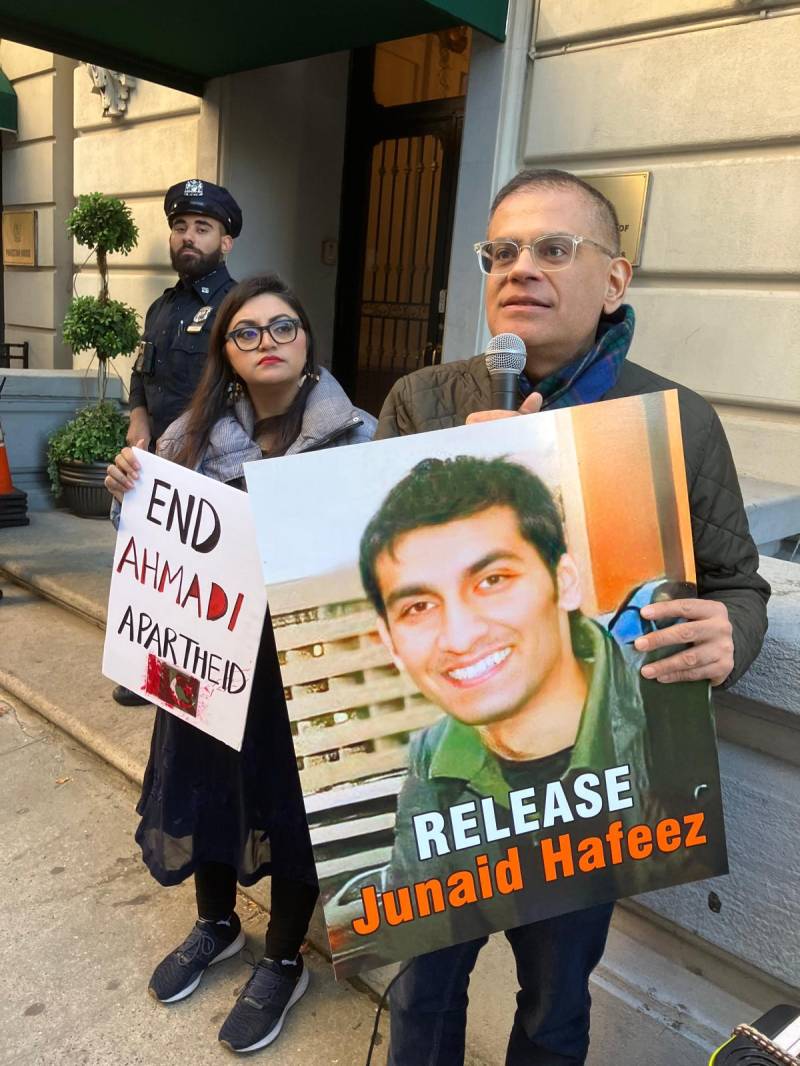
It was demanded that justice must also be served to Syed Khan, also known as Sakhi Lala, for his custodial death in Quetta by putting Constable Syed Mohammed Khan on trial.
"We urge justice for Suleman Khan of Sialkot, who was killed by a mob in Swat. We demand the unconditional release of Junaid Hafeez, other victims of the so-called 'blasphemy business group,' and others accused of fabricated blasphemy charges," they demanded, whilst rejecting the patronisation of religious extremist groups by the state and demand monitoring of the mushrooming of seminaries which were turning into nurseries for armed religious groups and where groups like the Tehreek Labbaik Pakistan (TLP) was threatening the lives and security of citizens - they demanded a ban on the outfit.
They emphasised the critical need for policy intervention to combat religious extremism, prevent the misuse of blasphemy laws, and protect the rights and lives of all citizens, especially those from minority communities.
"We urge the Pakistani government to implement rigorous reforms that shield individuals from baseless accusations and prevent the weaponisation of religious laws to justify violence."
The protest was supported by the World Sindhi Congress, Sindhi Association of North America, Jiye Sindh Qomi Mahaz (JSQM), Repeal the Second, The Exiled and Pakistan Progressive Forum.

